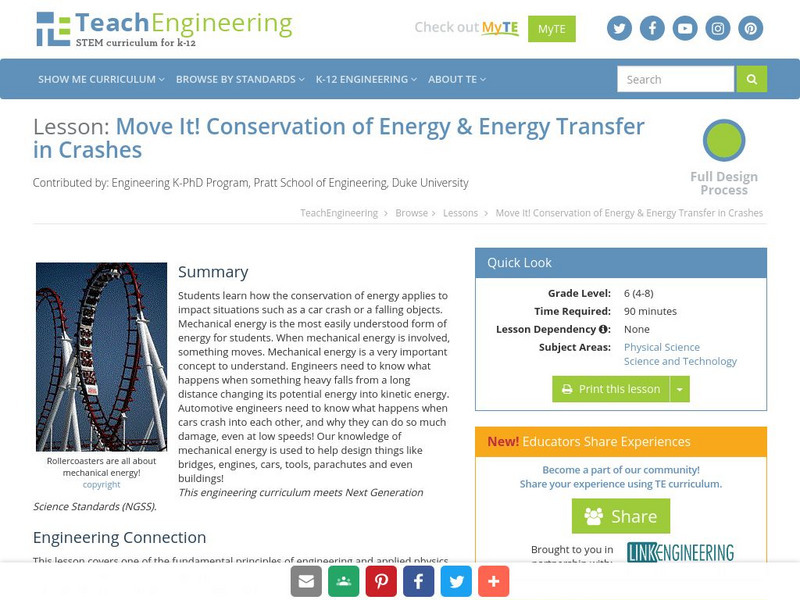Hi, what do you want to do?
Read Works
Read Works: Famous Scientists Sir Isaac Newton
[Free Registration/Login Required] This passage is a short biography of Sir Isaac Newton and his discovery of the force of gravity. This passage is a stand-alone curricular piece that reinforces essential reading skills and strategies...
NASA
Nasa: The Rocket Motor
An online version of a book pertaining to task of launching rockets into space and subsequently navigating them through space. The first several "chapters" (pages) describe the influence of gravity on Earth and the barriers which it...
Science and Mathematics Initiative for Learning Enhancement (SMILE)
Smile: The Center of Mass
This site from the Illinois Institute of Technology provides a lab activity in which students determine the location of the center of mass of an irregularly shaped object. Observations are related to the balancing point of the object....
Georgia State University
Georgia State University: Hyper Physics: Circular Orbit
The necessity of gravitation to a circular orbit is discussed and equations for the orbital speed are derived from the law of universal gravitation. Binary systems in which two objects orbit about a center of mass are explained and...
Concord Consortium
The Concord Consortium: Molecular Workbench: A Suspended Rope
Adjust the elasticity and mass of a rope suspended between two points to see how it will be affected by gravity.
NASA
Nasa: Kepler's Second Law
This site from NASA states Kepler's second law of planetary motion and depicts its meaning with an informative diagram. Relates the law to conservation of energy principles and discusses the eccentricity of a satellite's (or a planet's)...
TeachEngineering
Teach Engineering: Move It!
Mechanical energy is the most easily understood form of energy for students. When there is mechanical energy involved, something moves. Mechanical energy is a very important concept to understand. Engineers need to know what happens when...
Other
Fermi National Accelerator Lab: Discovery of Top Quark
This article announces the discovery of the top quark and its significance in particle physics.
Khan Academy
Khan Academy: Start: How Do Computers Simulate the Motion of Virtual Particles?
In this lesson we'll explore how we use fairly simple physics to draw particles which move according to the forces we feel in the real world (such as wind & gravity).
Science Education Resource Center at Carleton College
Serc: Marble Stop
In this two-part lesson, students will discover that no matter what the shape of the track, the marble will rise to the same vertical height. They will begin to understand the concepts of gravity, motion, and force.
American Association of Physics Teachers
Com Padre Digital Library: Open Source Physics: Sliding Down an Incline Plane
Here is a simulation demonstrating an object placed on an inclined plane. The user will vary the slope of the plane to see the relationship the slope has on the gravity of the object and the static friction.
Other
Wikibooks: Physics Study Guide
A handy resource that gives an overview of equations and definitions pertinent to an introductory, college-level physics course, with two of its three sections focusing on motion-related topics and principles.
Physics Classroom
The Physics Classroom: Satellite Motion
An animation depicting the path of projectiles launched at various launch speeds from the fictional Newton's Mountain. Accompanying text discusses satellite motion and the requirements of orbital motion. Links to further information is...
Physics Classroom
The Physics Classroom: Mathematics of Satellite Motion
The mathematics associated with the motion of satellites is described. Equations (for period, velocity, acceleration and force) are stated, symbols described, and sample problems solved. Includes five practice problems with solutions and...
Lawrence Berkeley National Laboratory
Berkeley Lab: La Aventura De Las Particulas
Learn the fundamentals of particles and forces with this site. Explore the paths that explain matter in the universe.
Math Is Fun
Math Is Fun: Apparent Weight
Apparent weight is explored in this tutorial. Definitions and examples are provided.
Bill Nye
Bill Nye: Penny Droplets
This tutorial by Bill Nye introduces the concept of a cohesive force through an experiment involving a penny and droplets of soapy water.
Physics Classroom
The Physics Classroom: Static Electricity: Lesson 3: Inverse Square Law
Electrical force between two electrically charged objects is inversely related to the distance between the two objects. Investigate why this becomes the inverse square law of physics. Engage in the Coulomb's Law interactive and check...
Physics Classroom
The Physics Classroom: Circular Motion Principles for Satellites
From The Physics Classroom. Uses easy- to-understand language to discuss how circular motion principles apply to the motion of satellites. Describes the tangential velocity and centripetal acceleration of a satellite. Includes many...
Physics Classroom
The Physics Classroom: Energy Relationships for Satellites
The orbits of satellites are described and an energy analysis is performed. Kinetic, potential and total mechanical energy are explained and applied to the motion of satellites.
Physics Classroom
The Physics Classroom: Kepler's Three Laws
The three laws of planetary motion as described by Kepler are stated and elaborated upon. Useful graphics and an easy-to-understand language are used to explain the nature of planetary motion. Both conceptual and mathematical. Includes a...
Khan Academy
Khan Academy: Newton's Law of Gravitation Review
Review the key concepts, equations, and skills for Newton's law of gravity, including how to find the gravitational field strength.
Curated OER
Hyper Physics: Gravity
Gravity as a fundamental force is explained and an equation for universal gravitation is given.
Curated OER
Hyper Physics: Gravity
Gravity as a fundamental force is explained and an equation for universal gravitation is given.



















